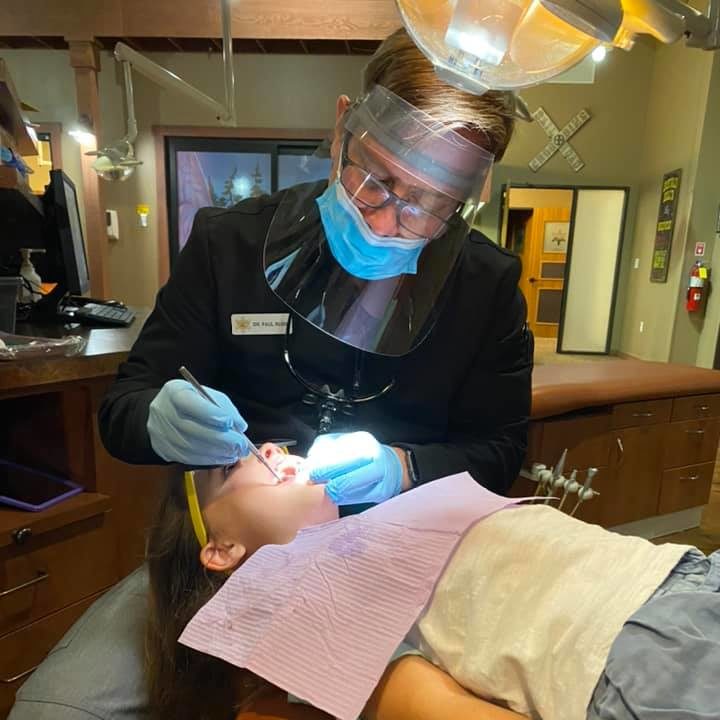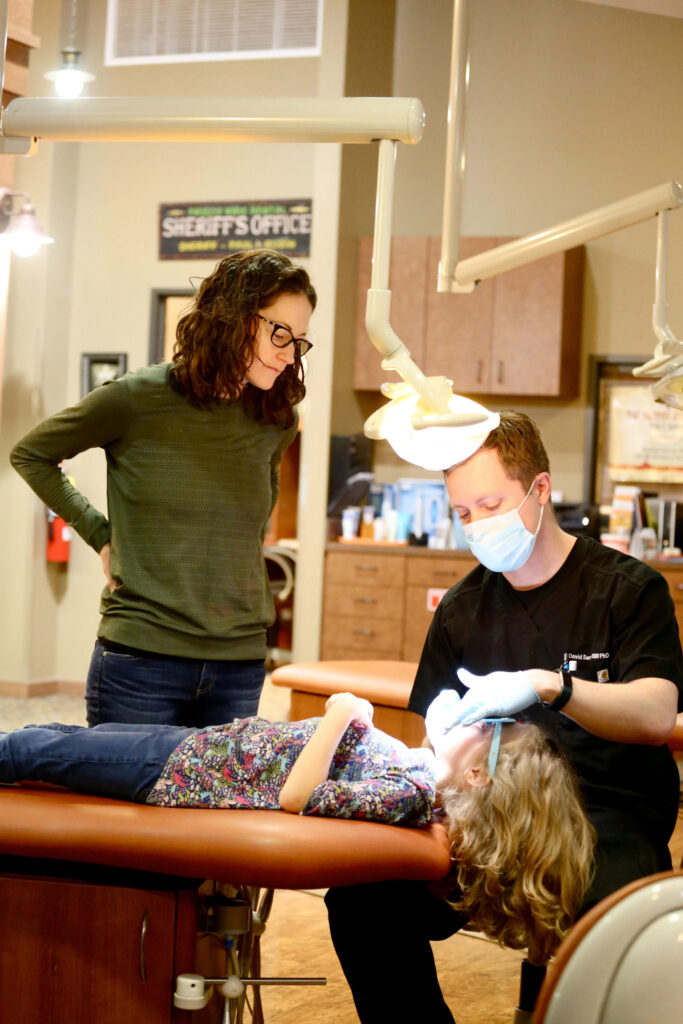Baby Root Canal (Pulpotomy) in Frisco, McKinney, and Prosper, TX
Lonestar Kid’s Dentistry offers baby root canals (pulpotomies) in Frisco, McKinney, and Prosper, TX.
Baby teeth play a crucial role in speech development, chewing, and guiding permanent teeth into place.
However, when severe tooth decay, a traumatic injury, or deep tooth pain affects a primary tooth, a baby root canal (pulpotomy) may be necessary to save it.

What Is a Baby Root Canal (Pulpotomy)?
Baby root canal is actually a misnomer, as pediatric dentists do not perform root canals on baby teeth. Another name for this procedure is a pulpotomy, or a primary root nerve treatment.
It is very different from a root canal on a permanent tooth. Unlike an adult root canal, which removes all the pulp and nerve tissue, a pulpotomy only removes infected pulp from the upper portion of the tooth while keeping the healthy pulp intact.
When the coronal pulp, the top part of the inner tissue of the tooth, becomes inflamed or infected, treatment is necessary. Untreated cavities, severe tooth decay, or physical trauma can cause this condition.
During the procedure, the diseased pulp tissue is removed from the pulp chamber. It is then disinfected and a special medication is applied to calm the remaining healthy pulp. The tooth is then sealed with dental cement, and a dental crown is placed over it to protect the tooth until it naturally falls out.
Preserving the tooth prevents early extraction and maintains the necessary spacing for permanent teeth.
Types of Pediatric Dental Crowns
After a pulpotomy, a dental crown is placed over the treated tooth to restore function and protect it from further damage. Different types of crowns are available based on durability, aesthetics, and cost.
Here are the options parents can consider:
- Zirconia: Made from strong ceramic material, zirconia crowns are metal-free, biocompatible, and highly resistant to wear and staining. Zirconia crowns provide a natural look and are a great choice for both front and back teeth.
- Stainless steel: Known for its strength and durability, these crowns are often used on molars that require extra reinforcement. They are cost-effective but not tooth-colored.
- Bonded resin composite strip: Made from composite resin, these crowns provide a natural look but are less durable than zirconia or metal options. They are typically used for front teeth, where aesthetics are the main concern.
Why Save Baby Teeth?
Parents often ask why baby teeth need treatment if they will eventually fall out.
Although temporary, baby teeth help guide adult teeth into place and support proper oral development. Removing an infected baby tooth too soon may cause misalignment, making it harder for permanent teeth to grow correctly. This could lead to the need for future orthodontic treatment.
A pulpotomy helps keep the tooth roots intact and the tooth alive. It also lowers the risk of bacterial growth, tooth loss, and spreading infection.

Signs Your Child May Need a Root Canal
Not all cavities require a pulpotomy, but severe cavity-related infections or injuries to primary molars may necessitate this treatment.
Signs your child may need a pulpotomy include:
- Deep tooth pain or severe tooth decay
- Tooth sensitivity to hot or cold foods
- A painful tooth that does not improve
- Swelling or redness around the infected tooth
- A broken tooth or decayed baby tooth
- Pus or abscess near the affected area
- Changes in your child’s oral care routine due to discomfort
If your child experiences any of these symptoms, seek prompt dental care to prevent further infection and avoid the need for more invasive procedures.
⚠️ Don't Ignore the Signs!
Tooth pain, swelling, and sensitivity to hot or cold foods can all indicate a serious issue. If left untreated, an infection could spread and lead to more invasive treatment.
The Baby Root Canal Procedure
A pulpotomy is a straightforward dental procedure that typically takes just one visit. Here’s what parents can expect from the entire procedure:
- Exam: The dentist will assess the extent of the decay and determine if a pulpotomy is the best treatment option.
- Dental sedation: If needed, sedation can be used to keep your child comfortable and relaxed.
- Remove infected tissue: The dentist will carefully remove the infected pulp tissue from the pulp chamber while preserving healthy pulp.
- Application of medication: A special medication is applied to help protect the remaining nerve tissue and soft tissues.
- Seal the tooth: The dentist will seal the tooth with dental cement to prevent further bacterial growth.
- Crown placement: A crown is placed over the tooth to restore function and protect the remaining tooth structure.
Aftercare & Recovery
Following a pulpotomy, your child may experience mild tooth sensitivity, but this typically subsides within a few days.
To aid in recovery and maintain dental health, follow these aftercare tips:
- Offer soft foods for the first 24-48 hours.
- Avoid sticky foods that could dislodge the crown.
- Use over-the-counter pain medication if necessary.
- Maintain a good oral hygiene routine with regular brushing and flossing.
- Schedule regular dental check-ups to monitor the treated tooth.
FAQs About Pulpotomies
Pulpotomies have a high success rate when done on primary teeth with healthy pulp. A treated baby molar can stay functional until it naturally falls out. This lowers the risk of early tooth loss and helps keep space for permanent teeth. Choosing this procedure instead of extraction helps keep your child’s bite aligned and supports their oral health.
Pulpotomies are effective, but the treated tooth may still need further care if the infection spreads or if decay continues.
A pulpotomy is a simpler procedure suited for baby teeth, while a root canal is a more extensive treatment for permanent teeth.
No, local anesthesia and sedation options keep children comfortable during the procedure.
Most children recover within a few days, with mild sensitivity that fades quickly.
✅ Quick Recovery Tip!
Stick to soft foods for the first 24-48 hours and avoid sticky or chewy foods to keep the crown secure.
Quality Dental Care for Your Little Ones
Caring for your child’s primary teeth sets the foundation for their future oral health. Baby root canals are a reliable and effective option to restore damaged baby teeth.
At Lonestar Kid’s Dentistry, our goal is to educate parents and patients to create life-long, positive dental habits. Our carefully selected dental team is dedicated to making every visit comfortable for your little one.
We proudly serve our little patients and parents at three locations: Frisco, McKinney, and Prosper. Our pediatric dentists, Dr. Paul Rubin, Dr. David Sentelle, Dr. Ashley Orynich, are committed to providing exceptional dental care for your child. Contact us today to schedule an appointment for your child and give them the gift of a healthy, beautiful smile!
To book an appointment at our pediatric dental office in Frisco, TX call (214) 618-5200 or complete the online contact form. We are located at 6801 Warren Parkway, Suite 115, Frisco, TX.
To book an appointment at our pediatric dental office in McKinney, TX, call (214) 436-5555 or complete the online contact form. We are located at 5323 W University Dr #100 McKinney, TX.
To book an appointment at our pediatric dental office in Prosper, TX, call (469) 228-4402 or complete the online contact form. We are located at 240 S. Preston Road, Suite 10, Prosper.
